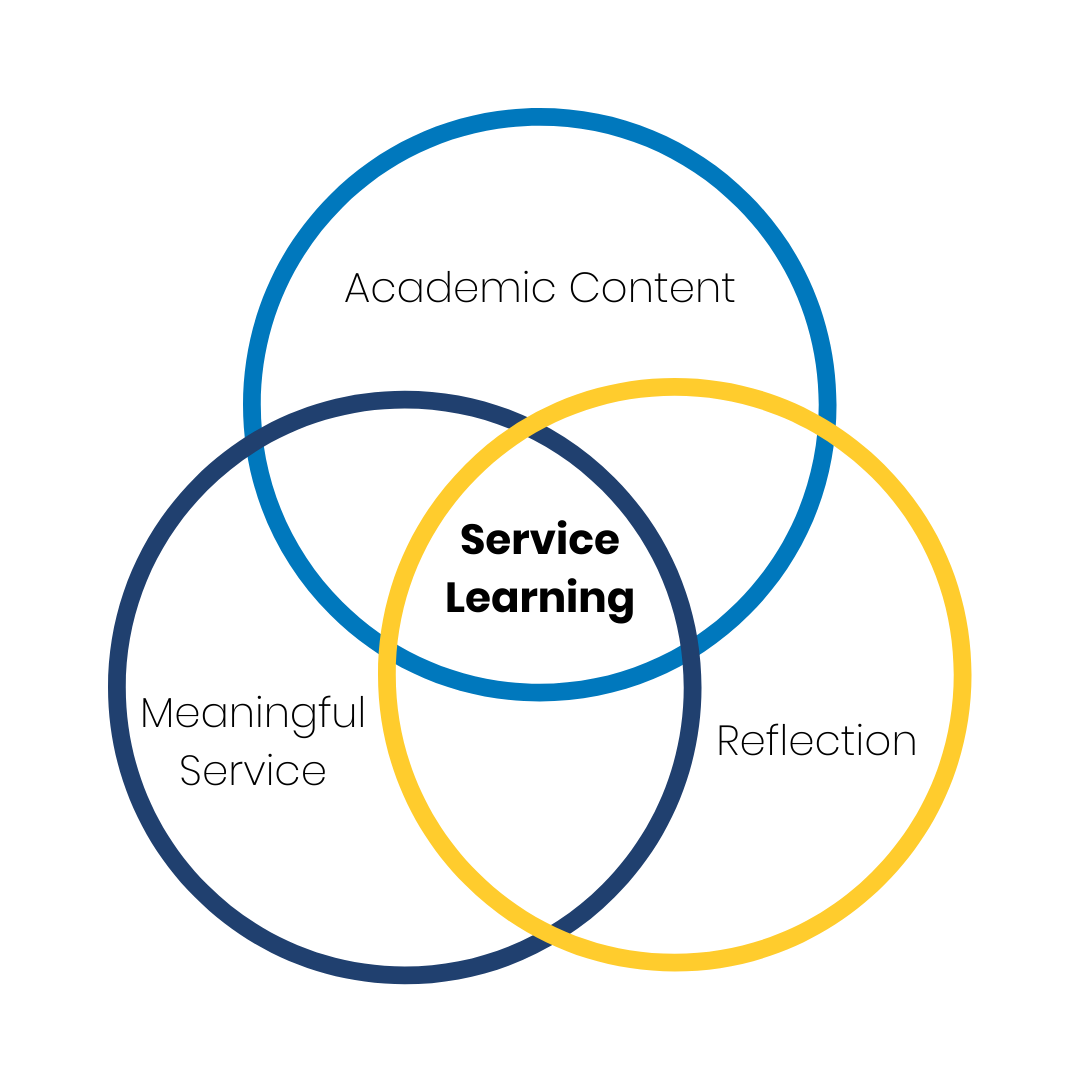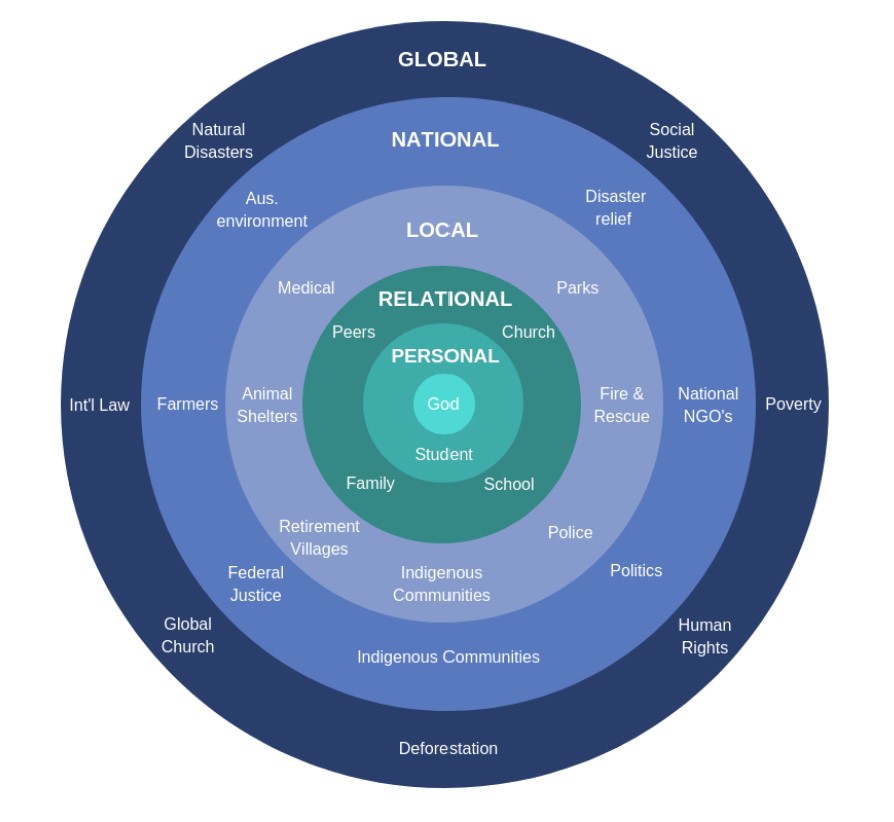Such a common question asked by parents around the globe, with a range of answers likely from ‘Nothing’ or ‘Don’t remember’, to something a little more forthcoming. But the best answers come from students who are totally engaged with their academic learning because they see it as part of the bigger picture of life. ‘We organized a concert for the old folk at the nursing home; we prepared meals for people affected by the fires; we filled Christmas boxes for Samaritan’s Purse; we became pen-friends with students from a school in Asia to help them practice their English skills; we raised money to purchase toilets for a school in Africa; we sewed quilts for the women’s prison; we prepared a vegetable garden site for the Early Learning Centre children. In other words, we practiced and honed our academic skills and abilities while we engaged with the needs of the world.
A teacher’s most important task is not to prepare students merely for a career, but to prepare them for a life which includes a career. Teachers are far more than facilitators of individual growth or trainers of future employees. Christian schools aim to prepare young people for works of service (Eph. 4:11-12) in order that the whole world might be redeemed from its brokenness and flourish in the way God always intended. Function is important, but character and purpose are always superior.
3. What does it mean to be a Flourishing School?
We all know it’s about far more than academic grades and ATAR scores. But unless we are intentional, a narrow focus on academic success can become our default position. As the old saying goes, “Christian schools don’t naturally happen. They naturally unhappen!”
Hugh Whelchel, in his ‘Four Defining Characteristics of Biblical Flourishing’ (IFWE, 2014) writes, “The Biblical view of flourishing stands apart from all others in that it provides not only a vision, but also the means by which a person can achieve flourishing…. Biblical flourishing is missional, priestly, and outward focused, motivated on spreading God’s glory throughout the earth. We flourish when we help others flourish (Jeremiah 29:4-7).” Hence we turn to the concept of service-learning.
For CSA and ACSI resources on a biblical view of flourishing schools, take a look at Flourish: A Vision of Christian Schooling with videos and materials covering the areas of vision, culture, faith and practice. This recent blog post from Dr Rob Loe is another excellent resource challenging us to consider the essence of wellbeing. And if you're interested in further resources on leadership for flourishing schools ACSI also have this great PDF and this blog post, both of which are exceptionally helpful for personal growth and use with your teams.
4. Service-learning as a Pedagogical Method
Swaner & Erdvig (2018) define service-learning as ‘a powerful pedagogy that connects classroom learning with service opportunities in the community, in an iterative cycle where student learning is facilitated through structured reflection’. Service-learning is a relational and experiential pedagogy, actively involving students in a range of experiences which benefit the wider community (local, national or global), while meeting the Australian Curriculum requirements and developing General Capabilities. Real-world application and contextualisation of skills and knowledge allow students to synthesise their classroom learning with meaningful action and critical reflection, while promoting Christian virtues, biblical principles, community engagement and faith formation.
When mission and service are seen as central to a Christian vision of holistic education, schools are able to engage students simultaneously in rigorous academic learning, heart-transformation and a practical response. Student outcomes then include growth in compassion, appreciation of human diversity, leadership capability, character development, faith, and capacity for academic learning. Those human yearnings for Identity, Well-being and Purpose can be fully addressed by effective service-learning.

5. Service-learning as a Resource for Your School
Most Christian schools would love their Year 12’s to graduate as compassionate, servant-hearted, well-prepared disciples of Jesus Christ. That doesn’t just happen! The challenge is always about converting right theory into best practice.
As a first step, does your school have a documented philosophical and practical approach to mission and service which aligns with your school’s vision and your ideal graduate profile? How long has it been since you have audited your mission and service policies and programs? Is there a designated person in your school with this responsibility? Remember that we invest in what we value!
CSA has produced a comprehensive Service-Learning resource which is a companion to its Christian Studies Program andCurriculum Resource documents. Its introduction states, “We believe that Christ’s mission is our mission, and as such, followers of Jesus are called to participate in God’s redemptive plan of healing, renewing and restoring all things”.
The resource demonstrates how the service opportunities and partnerships you are already engaged with can be linked to classroom learning and curriculum outcomes. It includes a comprehensive F-12 matrix with service learning examples, activity ideas, links to Aust Curriculum outcomes, and bible integration options.

In a nutshell, the CSA service-learning resource includes:
- a biblical rationale for service-learning
- a suggested pathway for service
- information on developing a school-wide culture of service
- many ideas for integrating service with the F-12 Australian Curriculum outcomes
- case studies with practical advice from Christian school colleagues
- a comprehensive list of partner organisations and contacts.
- appendices with guiding principles and bible verses regarding service
In Conclusion
Can students actually learn what it means to flourish and glorify God and reach their full potential without engaging in service activities? I am convinced that service-learning is an indispensable pedagogical method for Christian schools which has both immediate and long-term (and potentially eternal) impacts.
You may like to connect with school leaders who already have long-standing experience and well-developed documentation around service and mission in the Christian school context. For example, St Andrews Christian College in Victoria has long been committed to implementing its Global Horizons Program. The College now has a Mission Service Learning Coordinator on staff and even a Mission Service Learning Captain amongst the student cohort. Catriona Wansbrough, SACC Principal, says, “Although known for our academic rigour, we are a school community that …. offers an education rich in hope and purpose that delivers more than just good results.”
To converse more about next steps for your school or about how to connect with either a Christian school in the Asia-Pacific region or an Australian partner organization for mission or service opportunities, simply email me.
Let me conclude with this challenge:
If our graduates understand all the elements of economic theory but use it only for self-advancement.
If they can solve the most complex of polynomial equations but are not filled with awe at the Creator of such elegance and design and consistency.
If they have studied all the cultures of the world, but do not have love for their neighbour.
If they can follow intricate recipes and produce amazing meals, but have no interest in hospitality and friendship.
If they can win debates and write outstanding persuasive essays, but have no awareness that truth without love is meaningless.
Then can we say that our graduates have been truly educated?